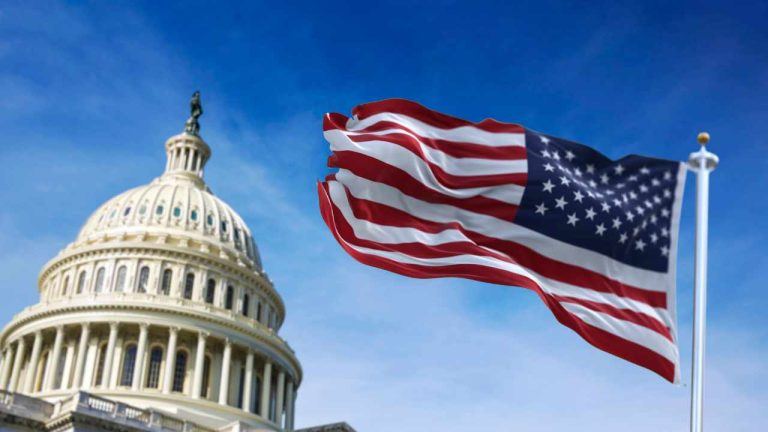 The House of Representatives has passed Congressman Tom Emmer’s CBDC Anti-Surveillance State Act, which prohibits the Federal Reserve from issuing a surveillance-oriented central bank digital currency (CBDC). The lawmaker emphasized that the bill protects American values of privacy and individual sovereignty, countering potential governmental overreach. CBDC Anti-Surveillance Act Clears House Following the passage of the […]
The House of Representatives has passed Congressman Tom Emmer’s CBDC Anti-Surveillance State Act, which prohibits the Federal Reserve from issuing a surveillance-oriented central bank digital currency (CBDC). The lawmaker emphasized that the bill protects American values of privacy and individual sovereignty, countering potential governmental overreach. CBDC Anti-Surveillance Act Clears House Following the passage of the […]
Attorney Marta Belcher joins The Agenda podcast to unpack financial surveillance’s vast infrastructure and warn of the potential ramifications of central bank digital currencies.
When most people think of surveillance, they probably think of cameras on street corners, government agencies collecting emails, or smartphones and smart home devices listening to conversations. But there is another form of government and corporate surveillance that gets less attention but is just as prevalent: financial surveillance.
On Episode 12 of The Agenda podcast, Jonathan DeYoung is joined by Marta Belcher, a cryptocurrency and civil liberties attorney who serves as president and chair of the Filecoin Foundation and general counsel and head of policy at Protocol Labs, which helps develop the Filecoin protocol. The two discuss a wide range of topics, from the ins and outs of financial surveillance in the United States to why governments are turning away from cash in favor of central bank digital currencies (CBDCs).

To understand how financial surveillance is carried out in the United States, one must first understand the U.S. Constitution. “The Fourth Amendment basically says, if you want to get information about a person in the United States, you as law enforcement have to have a warrant that has to be signed by a judge based on you having probable cause of suspecting them of a crime,” Belcher explained.
However, under what is known as the “third-party doctrine,” the U.S. government holds that any information voluntarily handed over to a “third party” — such as a bank — can be collected without a warrant or probable cause. Given the amount of customer information banks are required to collect under the Bank Secrecy Act, the government winds up with a significant amount of information on the financial lives of everyday citizens.
Related: Who watches the watchers? CryptoHarlem founder Matt Mitchell explains why surveillance is the enemy
“When you think about today’s world, we live our entire lives through third parties. At any given moment in time, we are sending massive amounts of data to all sorts of third parties,” said Belcher.
“The government can get basically any information about us, and it’s rendered the Fourth Amendment useless.”
However, not everyone cares that such vast amounts of information are collected about them — but should they? “As an advocate for privacy and civil liberties, I encounter this common refrain of, ‘Okay, but why should I care?’” Belcher explained. “I have nothing to hide, and I don’t care if the government sees my financial transactions.”
According to the civil liberties attorney, this is a limited perspective:
“You may think you have nothing to hide right now, but at any point in time, the law could be different. At any point in time, an administration can change. And I think that it is important, and people are starting to understand why it’s important, to be able to make transactions that the government can’t see.”
CBDCs are controversial, with some arguing countries must digitize their currencies to remain competitive — while others condemn governments having greater control over everyday people’s finances. Belcher believes that a significant reason governments worldwide are developing CBDCs is to make financial surveillance easier, and that these programs are part of broader initiatives to phase out cash and other untraceable transactions.
“A cashless society is really a surveillance society. And what we’re seeing worldwide is this push to make transactions surveilable. And that includes things like pushing central bank digital currencies.”
According to Belcher, the potential ramifications of adopting CBDCs go well beyond expanded surveillance: “They’re also about control.” She explained that governments could theoretically not only create but revoke money, alongside controlling how and where individuals spend their funds.
A CBDC is a perversion of cryptocurrency, or at least the founding principles and protocols of it—a cryptofascist currency, expressly designed to deny you the basic ownership of your money by installing the State at the center of every transaction. https://t.co/720SYvqzZM
— Edward Snowden (@Snowden) October 9, 2021
“For me, that is terrifying, right?” Belcher said. “For the government to not only have visibility potentially into all of your financial transactions and to really shut down other potential avenues for those types of transactions, but for the government to also be able to revoke money is really terrifying.”
To hear more from Belcher’s conversation with The Agenda — including her experience interviewing Edward Snowden, the benefits of privacy coins and what people can do to challenge surveillance — listen to the full episode on Cointelegraph’s Podcasts page, Apple Podcasts or Spotify. And don’t forget to check out Cointelegraph’s full lineup of other shows!
Magazine: Asia Express: Ripple, Visa join HK CBDC pilot, Huobi accusations, GameFi token up 300%
This article is for general information purposes and is not intended to be and should not be taken as legal or investment advice. The views, thoughts, and opinions expressed here are the author’s alone and do not necessarily reflect or represent the views and opinions of Cointelegraph.
 Florida governor Ron DeSantis reiterated his call for a ban on central bank digital currencies (CBDCs) during a visit to Jacksonville on Tuesday. Last March, DeSantis pushed for legislation to prohibit a CBDC in Florida. At Tuesday’s event called “Government of Laws, Not Woke Politics,” he stated that if the U.S. Federal Reserve or Treasury […]
Florida governor Ron DeSantis reiterated his call for a ban on central bank digital currencies (CBDCs) during a visit to Jacksonville on Tuesday. Last March, DeSantis pushed for legislation to prohibit a CBDC in Florida. At Tuesday’s event called “Government of Laws, Not Woke Politics,” he stated that if the U.S. Federal Reserve or Treasury […] Investigative journalist James Corbett has recently referred to the ongoing global banking crisis involving SVB, Signature Bank, Credit Suisse and others as the “Panic of 2023,” drawing comparisons to what he views as historical precedents, and pointing ahead to an inevitable and bleak, technocratic surveillance future leveraging central bank digital currencies (CBDCs) should nothing be […]
Investigative journalist James Corbett has recently referred to the ongoing global banking crisis involving SVB, Signature Bank, Credit Suisse and others as the “Panic of 2023,” drawing comparisons to what he views as historical precedents, and pointing ahead to an inevitable and bleak, technocratic surveillance future leveraging central bank digital currencies (CBDCs) should nothing be […]
Ted Cruz said it is “more important than ever” to ensure the financial privacy of American citizens is preserved.
Republican Senator Ted Cruz has introduced a bill to block the United States Federal Reserve from launching a “direct-to-consumer” central bank digital currency (CBDC).
In a March 21 statement, Cruz said he introduced the bill to prevent the Fed from developing a retail CBDC “which could be used as a financial surveillance tool by the federal government.”
Cruz stated it’s “more important than ever” to ensure U.S. policy on digital currencies protects “financial privacy, maintain’s the dollar’s dominance and cultivates innovation,” and added:
“CBDCs that fail to adhere to these three basic principles could enable an entity like the Federal Reserve to mobilize itself into a retail bank, collect personally identifiable information on users, and track their transactions indefinitely.”
Cruz claimed the federal government has “no authority to unilaterally establish” a CBDC.
“We should be empowering entrepreneurs, enabling innovation, and increasing individual freedom — not stifling it,” he stressed.
The federal government has no authority to unilaterally establish a central bank currency.
— Senator Ted Cruz (@SenTedCruz) March 21, 2023
Read about my new bill in @FoxBusiness: Ted Cruz introduces bill blocking Fed from adopting central bank digital currencyhttps://t.co/LoX3u41nA4
Cruz’s anti-CBDC bill has the backing of Republican Senators Mike Braun of Indiana and Chuck Grassley of Iowa.
In statements, both expressed the belief that a CBDC would be used as a surveillance tool.
If the bill is passed into law, it would ensure that the state isn’t “snooping” on the finances of hardworking Americans, Grassley stated:
"The American people ought to be able to spend their money how they choose without the possibility that every transaction could be tracked by the government."
The anti-CBDC bill is a second attempt by Cruz, Braun and Grassley, who introduced a similar bill on March 30, 2022 to prohibit the Fed from issuing a CBDC directly to individuals.
However, nearly 12 months later, the bill still hasn’t moved past the introduction phase.
Meanwhile, considerable progress is being made on a U.S. dollar CBDC since President Joe Biden signed an executive order to “Ensuring Responsible Development of Digital Assets” in March, 2022.
In November, the Federal Reserve Bank of New York and several large financial firms including BNY Mellon, Citi, HSBC, and Wells Fargo participated in a 12-week digital dollar pilot program with MasterCard and SWIFT.
Related: ‘Programmable money should terrify you’ — Layah Heilpern
Cruz, Braun and Grassley aren’t the only U.S. politicians fighting to stamp out CBDCs.
On March 20, Florida’s Governor Ron DeSantis called on state lawmakers to introduce legislation banning the digital dollar in Florida.
DeSantis compared the digital dollar to China’s digital yuan and claimed the e-CNY has been used to extensively “monitor citizen behavior,” saying:
“Any way they can get into society to exercise their agenda, they will do it. So, what the central bank digital currency is all about is surveilling Americans and controlling behavior of Americans.”
No CBDC in Florida https://t.co/p9pwSTmrlN
— Ron DeSantis (@GovRonDeSantis) March 20, 2023
U.S. Congressman Tom Emmer recently introduced an anti-CBDC bill of his own on Feb 22.
Emmer also spoke of the privacy concerns surrounding CBDCs saying a programmable dollar could be “easily weaponized” as a spying tool to “choke out politically unpopular activity.”
Magazine: Are CBDCs kryptonite for crypto?
 Bitcoiners on Twitter recently pleaded with the CEO of the social media platform, Elon Musk, to preserve the account of late computer scientist and bitcoin pioneer Hal Finney. The outcry came after Musk announced that a mass of inactive accounts would be purged. Finney’s wife has since jumped in, and tweeted from Hal’s former account […]
Bitcoiners on Twitter recently pleaded with the CEO of the social media platform, Elon Musk, to preserve the account of late computer scientist and bitcoin pioneer Hal Finney. The outcry came after Musk announced that a mass of inactive accounts would be purged. Finney’s wife has since jumped in, and tweeted from Hal’s former account […] Since people are once again talking about self-custody as one of crypto’s unique strengths, I would like to remind everyone about an equally important fundamental value proposition of crypto that, in the early days, was touted as the killer feature. I’m talking about censorship resistance. The following opinion editorial was written by Bitcoin.com CEO Dennis […]
Since people are once again talking about self-custody as one of crypto’s unique strengths, I would like to remind everyone about an equally important fundamental value proposition of crypto that, in the early days, was touted as the killer feature. I’m talking about censorship resistance. The following opinion editorial was written by Bitcoin.com CEO Dennis […]